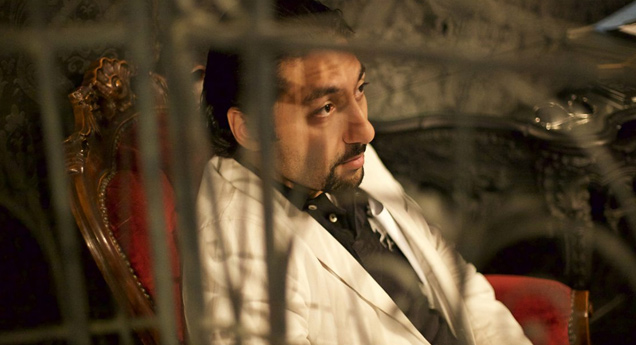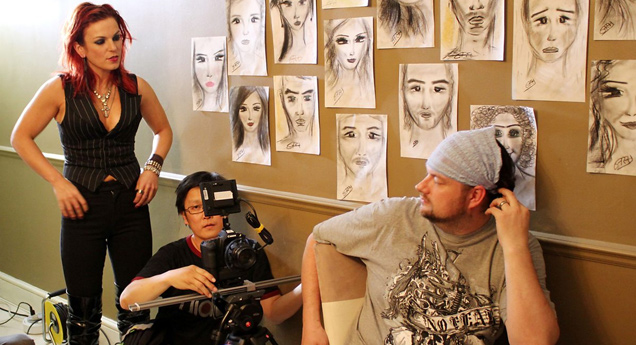Interview: Ben Lewis, Director of ‘Chancers: The Great Gangster Film Fraud’

One of a range of documentaries playing in the NZ Fraud Film Festival – taking place at Auckland’s Q Theatre this week on November 18 and 19, Chancers: The Great Gangster Film Fraud promises to be an apt closing film. Delving into the murky world of film financing, director Ben Lewis takes a decidedly non-dry approach to telling the story of an unlikely con, and how it came to bite a bunch of would-be filmmakers on the bum.
The film screens on Saturday November 19, followed by a panel discussion with local screen production icon John Barnett and Dominion Law’s Tim Riley offering a local take on the themes raised in the film, in conversation with moderator Wallace Chapman.
Ben Lewis joined us on the phone to offer an insight into his almost too-good-to-be-true film.
FLICKS: How do you go about making a movie about people who fraudulently tried to make a movie?
BEN LEWIS: It’s an incredibly difficult subject to deal with. You could go to accountants or film producers and say, “Let’s face it. Accounting in the film and television business is really dodgy, it’s really easy to inflate stuff, isn’t it?” And then the trick is, you defer it, you defer these inflated costs and add them to your bill, and then you tell the tax man, “That’s the total cost, and can you please have the VAT back, oh, and a 20% tax break?” And of course, no one would talk to me. The advantage of this film was that I had some kind of access.
You came across a story that’s pretty much too good to be true. How did you first find out about it?
It was in all the newspapers and I thought, “God, every production company, every directory in London’s going to be after this. I’m just small fry, I’m never going to get access to this.” There was one guy involved in it who wasn’t in prison, he was innocent. The director, Paul Knight, and it was quite easy to get his email off the internet.
I sent him an email and he actually agreed to meet me. He was seeing a couple of other production companies, and he really wanted the film to be a BBC Storyville episode. So, he went with me. I know all the Storyville people and I went there, and they commissioned it in 20 seconds. What was actually rather surprising, and disappointing, was that no European outlets were interested. They said, “The story is too British.” So, I thought it was very small-minded, to be honest with you.

As you started really kind of excavating the story, what things did you find, and how was that process for you?
Well, we got hold of all the court documents. We got transcripts of the whole case. And I made contact with some of the people involved, while others wouldn’t really talk to me at all. But Bashar I met him a few times. He couldn’t give me an interview, he was in prison, but he cooperated. I discovered that Bashar had made two other films, that he’d been a property developer in Buffalo in America, and all this sort of material. It didn’t require investigation, if that’s what you mean. It just required assembling a cast of interviewees, and then working out how one would make the film into a real tale.
Were the people involved embarrassed to go on the record?
Yeah, it took endless amounts of persuasion. Many people said, “No.” Lots of people said, “No,” who were closely involved. But I’ve probably got enough. I seemed to have got enough in the final film to tell the story and entertain people.
Was it difficult to tell the tale without making people look stupid?
Well yeah, I think I did that. I mean, we’re all human. People wanted a break. They wanted to go places. There are so many wannabes in London, dying to get into the film business, it’s easy to take advantage of them. I mean, it’s an interesting story. It was about vanity, and delusion, and desperation, and also other things like dedication and determination. I mean, they were very determined to actually make the film after they’d been arrested. What kind of psychology does it take to do that, to go that far?
Was there a self-delusion in that process, as well as outwardly deceiving?
I think to be a con man the first person you have to con is yourself. That’s what I learnt from the film, if you like. That’s what I learnt, that I didn’t know before. I’d never made a film about a con man, if Bashar really was a con man, who knows? He probably just thought the money would come in. But at any rate, you have to sort of believe. You have to believe that you’re right. You have to believe in your illusion. You have to believe that actually, the cheque will come in next week, that all you’re doing is doing stuff in advance, and everything somehow is going to become good, that you’re allowed to do that because that’s what society actually, and the government thinks is okay.
It’s commercially encouraged, that behaviour, almost.
Yeah, yeah, yeah, it’s called risk taking. Unfortunately, in this instance it was illegal. You don’t risk take with VAT. I mean, in a way, their fraud was really simple. They never got as far as getting tax breaks for making a film. They never got that far. That would have been the next step, and no doubt also getting investors from overseas, and setting up tax avoidance schemes for them. That was the next stage, but they never got that far. All they did was a basic VAT fraud, that was dumb.

Are you going to make a film with these guys in the future, do you think, now that you’ve established contact?
I wish I could. I wish I could. If only I could interview [actress] Aoife Madden. That would be great.
They haven’t tried to hire you as the director on an upcoming project then?
No, no. No, they haven’t. I’m making a feature documentary for Sky Atlantic and Sky Arts about the Beatles’ Apple Corporation, though, so that’s a really big film.
‘Chancers: The Great Gangster Film Fraud’ plays Q Theatre on Sat November 19


















